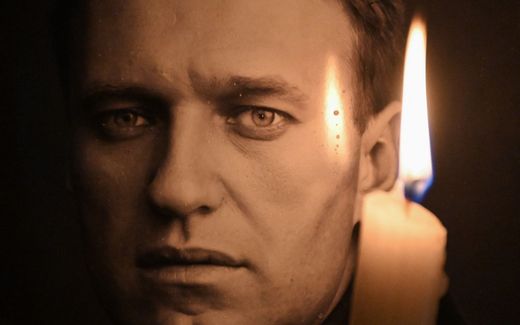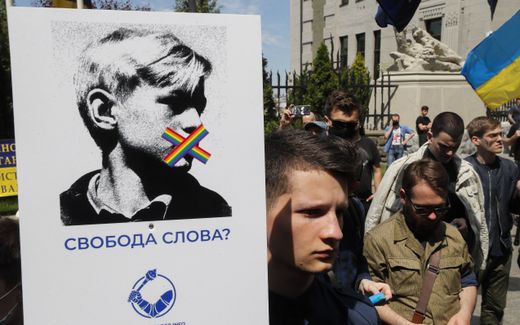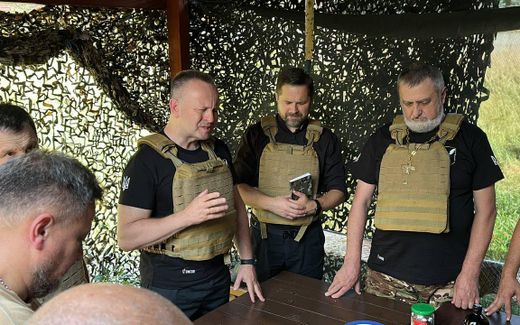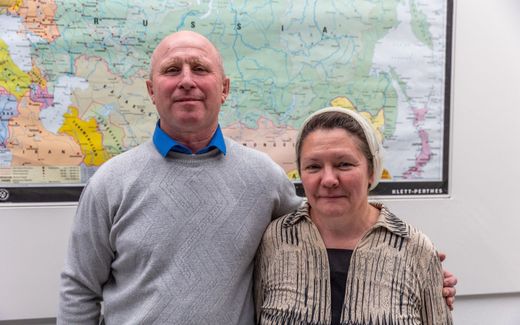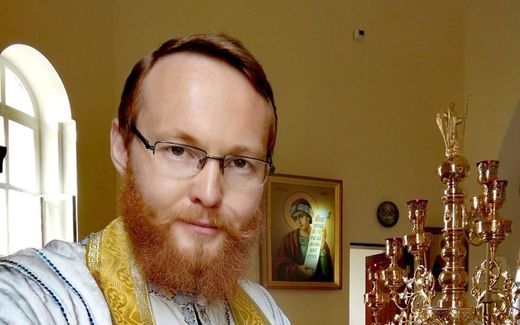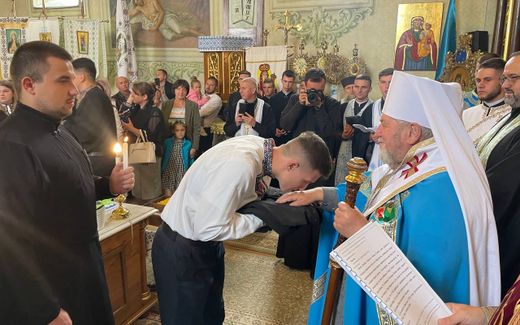Navalny’s book tells how a staunch atheist came to repeat Jesus's Sermon on the Mount

Copies of the late Russian opposition leader Alexei Navalny's posthumous book "Patriot: A Memoir" are pictured displayed for sale inside a bookshop. Photo AFP, Adrian Dennis
Eastern Europe
Navalny was baptised at a young age. Yet, Christianity did not become meaningful for him until later in his life. Especially more towards the end of his life, he opens up about his beliefs in Jesus. Yet, many Christians may feel alienated from the way he speaks about his faith.
Stay up to date with Christian news in Europe? Sign up for CNE's newsletter.
For the late Russian dissident Alexey Navalny, life became harder and harder towards its end. He no longer believed in his freedom but instead focused on his faith in Jesus. This is what he writes about his beliefs in his newly published memoir "Patriot".
What would you expect if you were about to read an autobiography of a political dissident? Critique of the regime? A political view? And sure, that is what you can find in the new autobiography of Alexey Navalny published in October. But more remarkable is his public choice for Christianity.
Once, Alexey Navalny was a staunch atheist. At the end of his life, he said that he found strength in his faith. He saw it as his task to seek the Kingdom of God and the righteousness thereof.
What caused this change? Was it born out of despair? It is not quite unimaginable if you look at the circumstances in prison that he describes. Isolation, cold, and refusal of medical help were part of his daily life in prison. And sometimes, the only book that he could read was the Bible.
However, considering the way he writes about his faith, a different conclusion emerges. It seems more a rational choice for which he provides clear arguments.
Baptism
So, where did it start? Well, the first encounter with Christianity already happened at the beginning of his life, Navalny points out in his autobiography. His parents were official atheists like all members of the Communist Party ought to be in the Soviet Union. However, his grandmother "feared God more" than the party. Thus, she went to church to baptise her grandchild. Yet, faith remained a distant thing for Navalny for a long time. Just like any other who grew up in the Soviet Union, he never believed in God, he acknowledges.
However, that changed with the birth of his daughter in 2001. Looking at his daughter, the Russian dissident could no longer believe that she was only the product of evolution, and that birth was only a biological issue. "There must be more. From a staunch atheist, I changed slowly into a religious person."
Sermon on the Mount
However, his faith would especially deepen during his time in prison. The shorter and scarcer his notes from prison, the more he writes about his faith. A few times he elaborates more about his faith in his book.
One of these instances is when he describes his final plea during a court case. There, he openly confessed that he was a believer and that his faith supported him in his activities. "I need less time to make decisions, and I'm placed in fewer dilemmas. Because that Book is there, and it more or less says what you have to do in a certain situation. It is not always easy to do what that Book says, but I do my best."
In the same plea, Navalny refers to the Sermon on the Mount from the Bible: "Blessed are those who hunger and thirst for righteousness, for they shall be satisfied." That is the guideline for his life, he says. The text helped him to keep in mind that millions of people in Russia long for truth and righteousness. "Sooner or later, they will reach their goal. They will be satisfied."
Praiseworthy
Not only did Navalny try to profess his faith with his words, but he also attempted to live like a Christian. For example, when he got into an argument with a fellow prisoner, and it turned out he was wrong. "I spoke to the owner of the kettle and said that I was wrong. I have the feeling that I did something right, something praiseworthy", Navalny describes the incident.
At the same time, he shows his struggles with the faith. "You have this feeling that you pretend to be this gentle Christian who continually offers apologies to everyone in a friendly, well-meaning tone of voice. People find that disturbing."
Hunger
Nevertheless, his Christian faith gave Navalny motivation to do what he thought must be done, for example, writing his book. In the process, he encountered two "signs" that encourage him to keep writing down his experiences.
The first had to do with Navalny's favourite Bible passage: the Sermon on the Mount. Just at the time when he was feeling down because of his hunger strike, when nobody was allowed to talk to him, and the only pastime he had was learning the Beatitudes by heart, he decided to go to church. And there it happened. The moment the priest opened the Bible and started reading, Navalny was struck by the chosen passage for that day: Matthew 5, the Sermon on the Mount. "I almost fainted, and it required great effort to prevent the tears from streaming down my face", he recalls in his memoirs. "My hunger disappeared."
The second token, Navalny experienced after his hunger strike had lasted more than two weeks. He then met Nikitin, a fellow prisoner who usually seemed to be annoyed by his presence. But this day, Nikitin gave Navalny a miniature icon. And even though it was only a small gesture, Navalny saw it as a sign. "I felt a lot better, spiritually and physically."
Worry
In the postscript of his book, Navalny summarises the meaning of faith in his life. He accepts his fate, even if that means that he will never leave prison alive. The key is to ask yourself if you are a real Christian, Navalny says. To ask yourself whether you believe in the religion of which the Founder sacrificed Himself for other people and paid the price of their sins, or whether you are convinced of the immortality of the soul. If so, Navalny points out you don't have to worry. "Don't worry about today because tomorrow will take care of itself."
Reviews in the media
Overall, Navalny's book is received with applause and approval by Western media. They praise his light tone of voice and his courage to stand up against the mighty Kremlin regime. Also, they are very positive about Navalny's charisma and his ability to organise large protests.
However, there are also some critical voices, for example, from the Frankfurter Allgemeine. The German newspaper calls the ironical passages in the book "self-praise". "It is a document of excessive self-overestimation, a testimony to the inability to look critically at one's own society and to understand the regime against which the author fought so heroically. "The Russian people are good, our leaders are terrible" – this banality is repeated word for word and in various variations countless times in the book."

Any reader who does not know much about the context of Russia should proceed with caution, the Frankfurter Allgemeine warns. It points out that the unknowing reader risks getting one-sided information. This danger lies mainly in the things that Navalny leaves unsaid.
For example, the Russian dissident writes about an unpleasant experience he had with Russian customs but spends no words on the first Chechen War in which tens of thousands of Russians died that ended that very same year. "A rather noticeable gap in a book entitled "Patriot"."
Actually, Navalny's consideration for people from other races is quite questionable as well, the Frankfurter Allgemeine says. In 2007, Navalny signed a document called the "Manifesto of the National Russian Liberation Movement Narod".

In videos he published for the Narod movement, he presents himself, for example, as a dentist. "Everything that bothers us should be removed through deportation." It shows skinheads chasing Asian-looking people through the streets. In another, he calls on Russians to arm themselves against Islamists, whom he portrays as vermin", Frankfurter Allgemeine writes.
Never has Navalny revoked his opinion on this publicly. He stated that he was only interested in forming a broad coalition, even if that included working together with "skinheads".
In his memoirs, Navalny keeps silent about his participation in Narod. For Frankfurter Allgemeine, this is a great disappointment. As the Russian dissident elaborates greatly on other, less important issues, "such gaps are particularly noticeable."
In addition, many Christians might feel estranged from the way Navalny talks about the Bible and about God. The sarcastic tone of voice in his book also appears in the passages where he speaks about his faith. And although Russians are known for their coarse language, speaking about “good old Jesus”, for example, might be interesting for secular Westerners. But for many believers, this may sound disrespectful.
Related Articles


